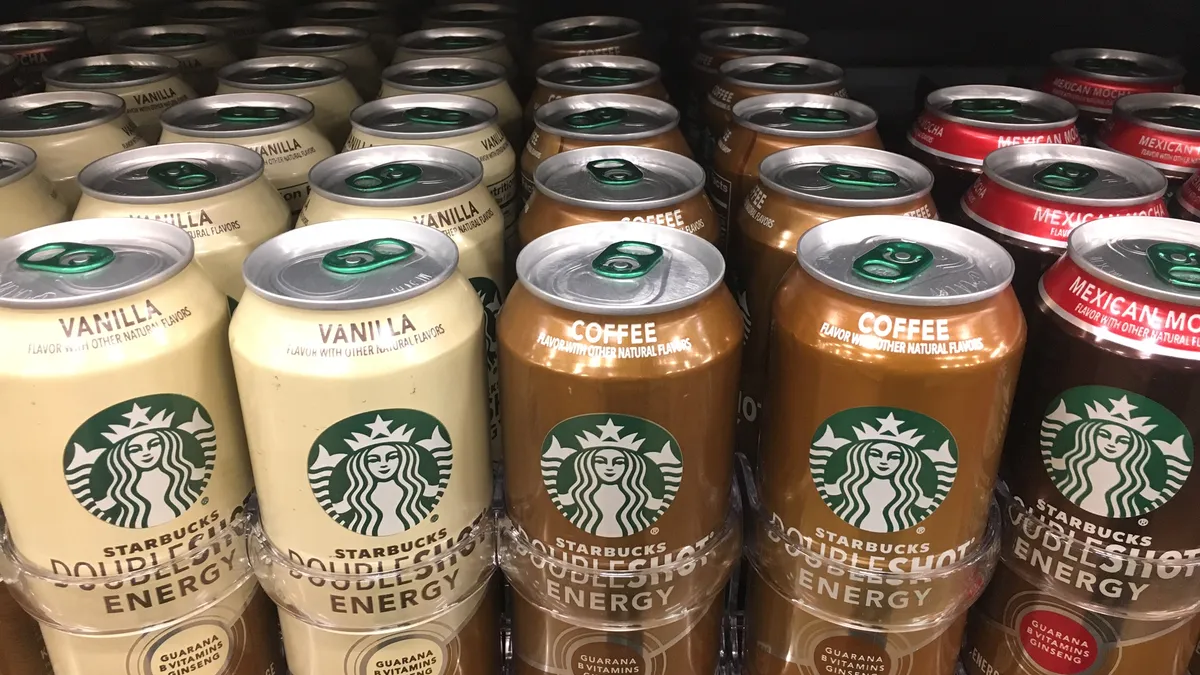Dive Brief:
- Nestlé, the world's largest food and beverage company, will pay coffee retailer Starbucks $7.15 billion to sell its packaged coffee around the world, Reuters reported.
- Nestlé's enormous distribution network combined with the popularity of Starbucks coffee is expected to be a lucrative deal for both parties, especially Starbucks, which has struggled to maintain its cafes' appeal in the U.S. due to increased competition from local coffee shops and chains.
- The transition will transform both companies' supply chains, and there could be a bumpy road ahead for procurement professionals and supply chain managers at both companies.
Dive Insight:
The recent Nestlé and Starbucks licensing agreement is another example of a marketing deal by two industry giants that may redefine the coffee supply chain, challenge existing distribution channels, and impact each of their sizable brands.
While the consumer may not see much of a change, except perhaps for some increased visibility of Starbucks' prepackaged coffee and tea in the marketplace, those in the supply chain can expect to see some immediate changes.
Starbucks is looking to a competitor to help market and distribute their coffee worldwide so they can focus on their core business. And that competitor is looking to increase their own market share and using Starbucks as the vehicle to do so. This all look so good on paper. Results in the marketplace may tell another story.
If history is an indicator, Starbucks will be very involved in Nestlé’s distribution and marketing efforts. A past unsuccessful deal with Kraft resulted in substantial penalties to Starbucks when they killed the deal early, citing damage to their brand.
Nestlé does have experience working with industry rivals, having cut deals with General Mills and Hershey. This agreement may be an example of a marketing and logistics success, or a battle of the mega brands that will leave both weakened.
Managers in procurement and the supply chain will now be working with a famous and intricate brand that means more than coffee to many of its adherents. Starbucks is a lifestyle brand that curries high levels of brand loyalty in their shops. But while the packaged coffees and teas sold in supermarkets maintain the brand, they are for sale in a crowded coffee aisle where price sometimes transcends brand. This can be a marketing challenge for Nestlé.
It is telling that 500 Starbucks employees will be joining Nestlé. This can help ease the transition and allow for the proper handoffs in the supply chain and logistics network. But it may be hard to assimilate 500 brand loyal employees into a once competitive organization.
In any event, the challenge for the Nestlé folks is to maintain relationships with their existing supply and distribution partners while integrating a new and famous product line, all with high visibility.
Starbucks is going to want to see large returns on their agreement. Nestlé’s existing suppliers and distribution channel partners may welcome the new business, but may also be nervous waiting to see changes in their business relationships. Supply chain professionals need to keep a level head and address issues head on, calming nervous suppliers and channel partners. Communication is key.
The bottom line is that both companies can win here, but it may take a while to properly identify and define success. In the mean time, those in the supply chain will have a ringside seat to a potential battle of the brands in and out of the supermarket aisle.














